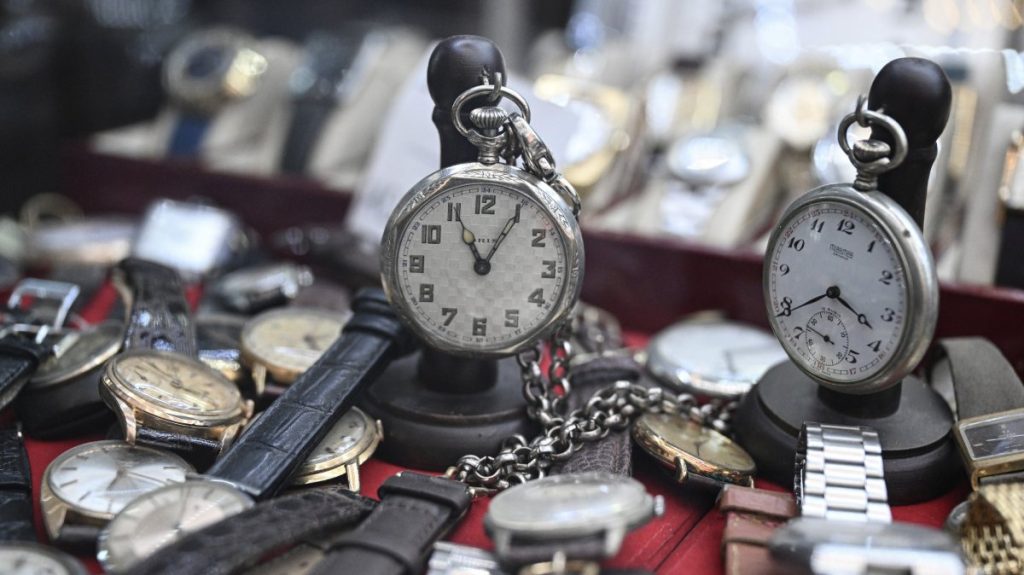Aydın Aydınoğlu, whose family migrated from Pristina, the capital of Kosovo, to the Samatya neighborhood in Istanbul’s Fatih district in 1963, continues the 110-year-old family tradition of watch repair as a third-generation craftsman.
Aydınoğlu, who resides in Istanbul’s Beyoğlu district, shared insights into his family’s migration journey, the current presence of Kosovo-born migrants in Istanbul and their contributions to the city’s culture.
Explaining that he learned the watchmaking craft from his grandfather and that his father and grandfather continued the trade after moving to Istanbul, Aydınoğlu said: “We are the children of a migrant family. In 1963, we migrated from Pristina, the capital of Kosovo, to our motherland, Türkiye. Although living conditions in Kosovo weren’t terrible, we regarded Türkiye as our homeland and moved here. Our family has been practicing this craft for approximately 110 years, and we are the third generation of this tradition.”
Aydınoğlu attributed their migration from Kosovo to the challenges of living as Muslims in the region at the time and their perception of Türkiye as their homeland. He explained: “We were Turks there; here, we’re Albanians. My grandmother passed away speaking only Turkish; she didn’t know Albanian. The same was true for my mother’s side – they knew Albanian because they lived there, but we are essentially of Turkish origin. During that time, many Muslims migrated from Kosovo to Türkiye due to the hardships of living under non-Muslim rule.”
Aydınoğlu recounted that when his family arrived in Istanbul, the city was home to various ethnic groups, much like today. He noted that they mainly lived among Greeks and Armenians in their neighborhood, trading and coexisting with them.
Aydınoğlu explained that, at the time, watchmaking was predominantly practiced by non-Muslims, which led to his family being initially perceived as “foreign” or “non-Muslim” due to their migrant status. He stated: “Back then, my grandfather and father were seen as foreigners because this craft was mostly practiced by outsiders. But that perception is completely wrong. We are descendants of the Turks who were settled in Kosovo by the Ottomans to bring civilization to the Balkans. After the Ottoman Empire’s collapse, we returned to our homeland. Although we are migrants, we are authentic Turks.”
He also pointed out that while Istanbul’s multicultural fabric remains intact, tolerance and respect for differences were more pronounced in the past. He shared: “In those years, trade and daily interactions were based entirely on trust, regardless of language, religion or race. Today, if you ask a shopkeeper in Beyoğlu for a glass of water, they might try to charge you for it. Unfortunately, we’ve lost our human values and conscience.”
Aydınoğlu mentioned that, similar to Beyoğlu’s fading cultural and social values, the watchmaking trade has also been affected by digitalization. He said: “During holidays, especially during Ramadan, we used to be incredibly busy. Once, on the eve of Ramadan Bayram, we repaired 200 clocks. We were so swamped that we barely managed to keep up with the workload. Today, due to modern smartphones, business has significantly decreased.”
He reminisced about the past, describing Sinemacılar Street, where their shop is located, as a hub for Yeşilçam actors and extras. He recalled: “This street used to be called Sinemacılar Street. Every morning, 100-150 extras from the gangster films of that era would pass through here. Even when Istiklal Avenue had vehicle traffic, this street was always bustling.”
Despite the declining interest in traditional watchmaking, Aydınoğlu expressed optimism, saying: “Enthusiasts still seek out our services. Watchmaking faces the risk of extinction today, but people still gravitate toward quality watches. Those who appreciate fine timepieces come to us. Skilled artisans will always have work because we can repair and restore broken parts. If we stop, this work will shift abroad. While we still have customers, if the current pace of digital transformation continues, it may become difficult to find a watchmaker 70-80 years from now.”


